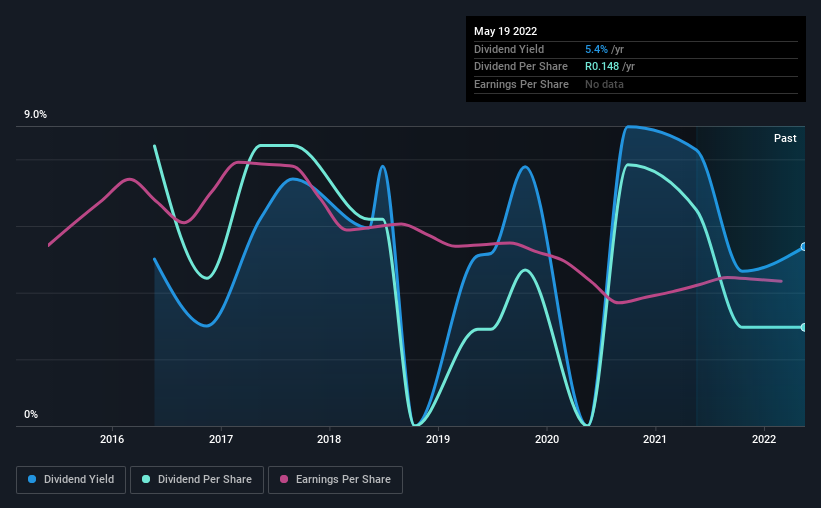- South Africa
- /
- Consumer Durables
- /
- JSE:BWN
Balwin Properties (JSE:BWN) Will Pay A Smaller Dividend Than Last Year
Balwin Properties Limited's (JSE:BWN) dividend is being reduced to R0.14 on the 20th of June. The dividend yield of 7.6% is still a nice boost to shareholder returns, despite the cut.
View our latest analysis for Balwin Properties
Balwin Properties' Earnings Easily Cover the Distributions
A big dividend yield for a few years doesn't mean much if it can't be sustained. Prior to this announcement, Balwin Properties' earnings easily covered the dividend, but free cash flows were negative. With the company not bringing in any cash, paying out to shareholders is bound to become difficult at some point.
Looking forward, EPS could fall by 12.9% if the company can't turn things around from the last few years. If the dividend continues along the path it has been on recently, we estimate the payout ratio could be 31%, which is definitely feasible to continue.

Balwin Properties' Dividend Has Lacked Consistency
Balwin Properties has been paying dividends for a while, but the track record isn't stellar. This suggests that the dividend might not be the most reliable. Since 2016, the dividend has gone from R0.42 to R0.15. The dividend has fallen 65% over that period. Declining dividends isn't generally what we look for as they can indicate that the company is running into some challenges.
The Dividend Has Limited Growth Potential
With a relatively unstable dividend, and a poor history of shrinking dividends, it's even more important to see if EPS is growing. Balwin Properties' earnings per share has shrunk at 13% a year over the past five years. Dividend payments are likely to come under some pressure unless EPS can pull out of the nosedive it is in.
The Dividend Could Prove To Be Unreliable
In summary, dividends being cut isn't ideal, however it can bring the payment into a more sustainable range. While the low payout ratio is redeeming feature, this is offset by the minimal cash to cover the payments. This company is not in the top tier of income providing stocks.
Investors generally tend to favour companies with a consistent, stable dividend policy as opposed to those operating an irregular one. At the same time, there are other factors our readers should be conscious of before pouring capital into a stock. Just as an example, we've come across 5 warning signs for Balwin Properties you should be aware of, and 2 of them don't sit too well with us. Looking for more high-yielding dividend ideas? Try our collection of strong dividend payers.
Valuation is complex, but we're here to simplify it.
Discover if Balwin Properties might be undervalued or overvalued with our detailed analysis, featuring fair value estimates, potential risks, dividends, insider trades, and its financial condition.
Access Free AnalysisHave feedback on this article? Concerned about the content? Get in touch with us directly. Alternatively, email editorial-team (at) simplywallst.com.
This article by Simply Wall St is general in nature. We provide commentary based on historical data and analyst forecasts only using an unbiased methodology and our articles are not intended to be financial advice. It does not constitute a recommendation to buy or sell any stock, and does not take account of your objectives, or your financial situation. We aim to bring you long-term focused analysis driven by fundamental data. Note that our analysis may not factor in the latest price-sensitive company announcements or qualitative material. Simply Wall St has no position in any stocks mentioned.
About JSE:BWN
Balwin Properties
Engages in the development and sale of residential properties in South Africa.
Proven track record with mediocre balance sheet.
Similar Companies
Market Insights
Community Narratives




